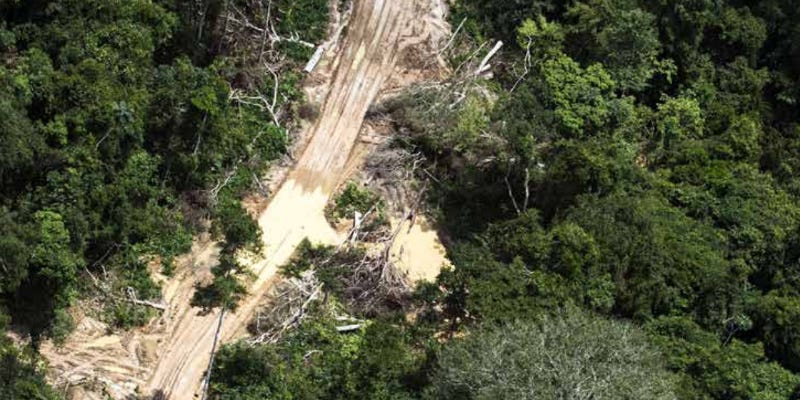Democratic Republic of Congo plans to lift logging moratorium

Last week, Eve Bazaïba, the vice prime minister and environment minister of the Democratic Republic of Congo announced plans to lift a ban on new industrial logging concessions that has been in place since 2002.
The plan, which is part of a series of measures supposedly aimed at “sustainable management of natural resources”, was adopted by the Council of Ministers on 9 July 2021. Other parts of the plan include a national forestry strategy, reviewing existing logging concessions, and putting in place a carbon tax.
A “cynical plan”
In a press statement, Irène Wabiwa Betoko, Greenpeace Africa Congo Basin forest campaign leader, said,
“The Minister’s attempt to dress up the lifting of the ban as a ‘good governance’ measure isn’t fooling anyone. It’s a cynical plan that will simply turn over more of DRC’s territory to foreign companies eager to trash the rainforest, opening a new lucrative highway for loggers.
“With the ongoing chaos in the forest sector and the absence of land-use planning, this measure is a threat to both people and nature. Instead of green lighting new paths of destruction, the DRC needs a blueprint for permanent protection of the forest, including management by the communities who live in it and depend on it.”
The Democratic Republic of Congo is currently revising its nationally determined contribution (NDC) to be submitted to the UNFCCC under the Paris Climate Accord. The country is also involved in a US$1 billion programme with the Central African Forest Initiative: “A New Rural Development Green Deal with the Democratic Republic of the Congo for 2021-2030”.
The CAFI Green Deal is targeted at the conservation of high value forests, agriculrue, demography, energy, and business climate and domestic resources mobilisation.
Joe Eisen, executive director of the Rainforest Foundation UK pointed out that,
“In the face of the growing climate emergency and chronic problems with existing logging titles in DRC, this announcement is simply incompatible with international commitments to protect this vital resource for future generations. The focus must surely be on scaling back the industry, not expanding it.”
Illegal logging concessions
In recent years, even with the logging moratorium in place, the country’s Environment Ministers have issued several logging concessions. In 2018, Amy Ambatobe, then-Minister of Environment, reinstated three illegal logging concessions to two Chinese-owned logging companies. The concessions covered a total of 650,000 hectares.
In 2020, Claude Nyamugabo, then-Minister of Environment, allocated logging concessions covering almost three million hectares to two Chinese firms and a Congolese company.
In June 2020, Nywamugabo issued four logging concessions to a Congolese company called Groupe Services. Three of the four concessions are in Mai Ndombe province. For years, the World Bank has been negotiating a REDD deal covering the whole of Mai Ndombe province under the Bank’s Forest Carbon Partnership Facility.
In June 2021, a group of NGOs in the DRC filed an administrative appeal to the cabinet of vice prime minister Bazaïba in order to cancel six of the concessions issued to a company called Tradelink SARL.
In July 2021, the Congolese Insitute for Nature Conservation (ICCN) confirmed that the concessions were illegal. But Bazaïba’s cabinet remains silent on the concessions, despite Greenpeace Africa’s repeated attempts to contact the cabinet.
“As far as the Environment Ministry goes, it’s playing ostrich,” commented Greenpeace Africa’s Wabiwa.





